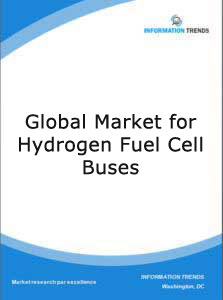
Executive Summary
This is the most comprehensive study on the hydrogen fuel cell bus (FCB) market which is poised to take off. Over the past few years, the prices of these buses have fallen dramatically, leading many companies to begin deploying them actively
The fuel cell bus market will generate a cumulative revenue of $73.4 trillion over the next 15 years. By then, hydrogen FCBs will be the fastest-growing segment of the bus market. The momentum for FCBs can be gauged by the fact that over 40 companies are producing buses based on the technology.
Advances in technology and manufacturing are reducing the cost of fuel cells and other components used in hydrogen buses. These advances are further helping drive down the cost of these buses and increasing their deployment rate.
Because of their lower costs, battery-electric buses have seen a faster adoption among zero-emission buses. However, hydrogen FCBs will see accelerated growth over the next 15 years, the forecast period of this study. By 2030s, the prices of hydrogen fuel cell vehicles will decline considerably, the cost of hydrogen will come down to less than $2.0, and the fueling infrastructure for hydrogen FCBs will become widespread.
So far, China has seen the highest growth of hydrogen FCBs, and the country will continue to be a leader in this space. Besides China, Asian countries rapidly adopting these buses include Japan and South Korea. Many European countries are witnessing an uptake in sales of these buses. Several U.S. and Canadian states are in various stages of entering this market as are many Latin American countries.
The prices of hydrogen FCBs are still substantially higher than those of electric buses. However, hydrogen buses offer some significant advantages that make them attractive. These advantages include the ability to travel longer distances, rapid and standardized fueling, better maneuverability, and the capability to carry heavier loads.
Until now, the growth of FCBs has been hampered by a lack of hydrogen fueling stations. Most hydrogen stations were built for passenger vehicles, but now there is an uptick in the deployment of hydrogen stations for buses and trucks. The fuel cells used in hydrogen buses have high energy efficiency. They have more energy per unit mass than diesel or gasoline.
With more than 15 years on the road and millions of km in passenger service, hydrogen FCBs have proven their performance and demonstrated reliable operation and extended daily drive cycles during all seasons and in challenging geographies
Hydrogen buses are an ideal substitute for fossil fuel-based buses. As a viable alternative to diesel and gasoline buses, hydrogen FCBs use sustainable, clean energy and offer a fueling experience comparable to diesel or gasoline vehicles.
Executive Summary
Press Release
Table of Contents
Order Study |





